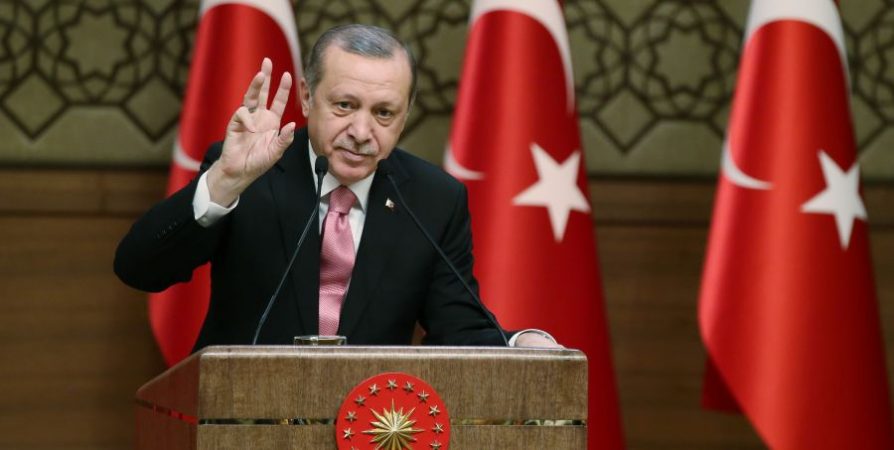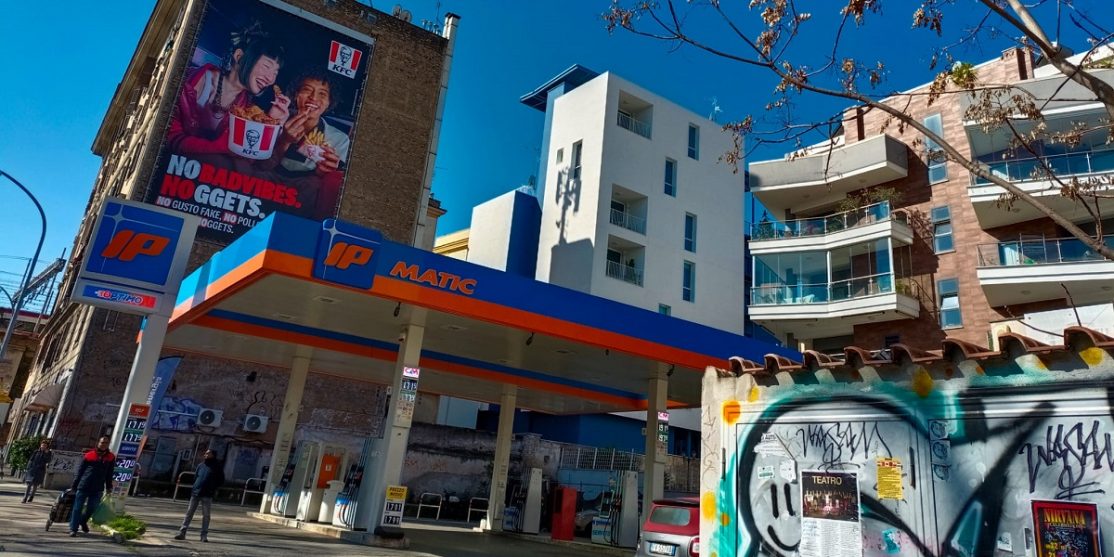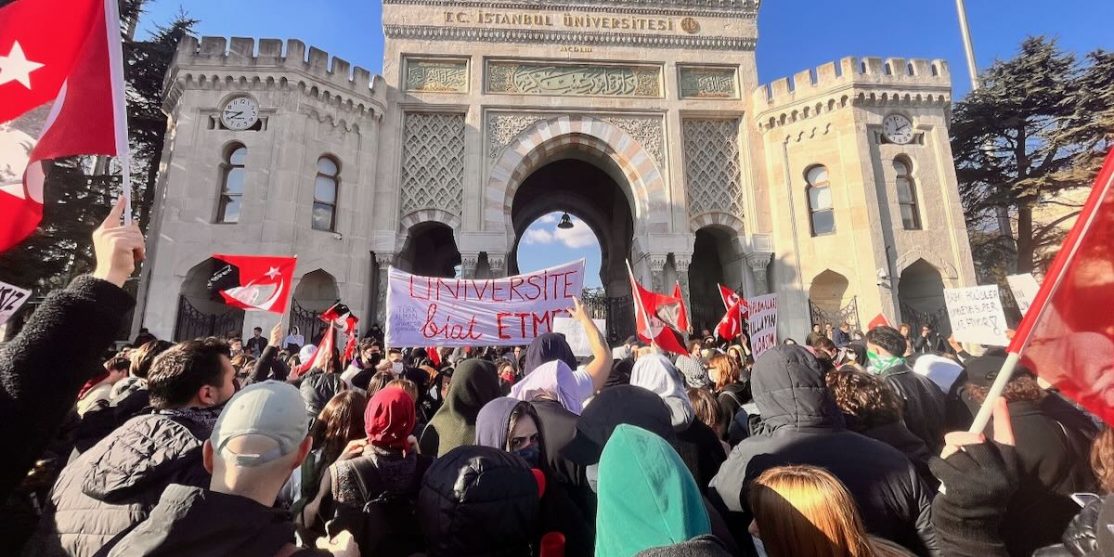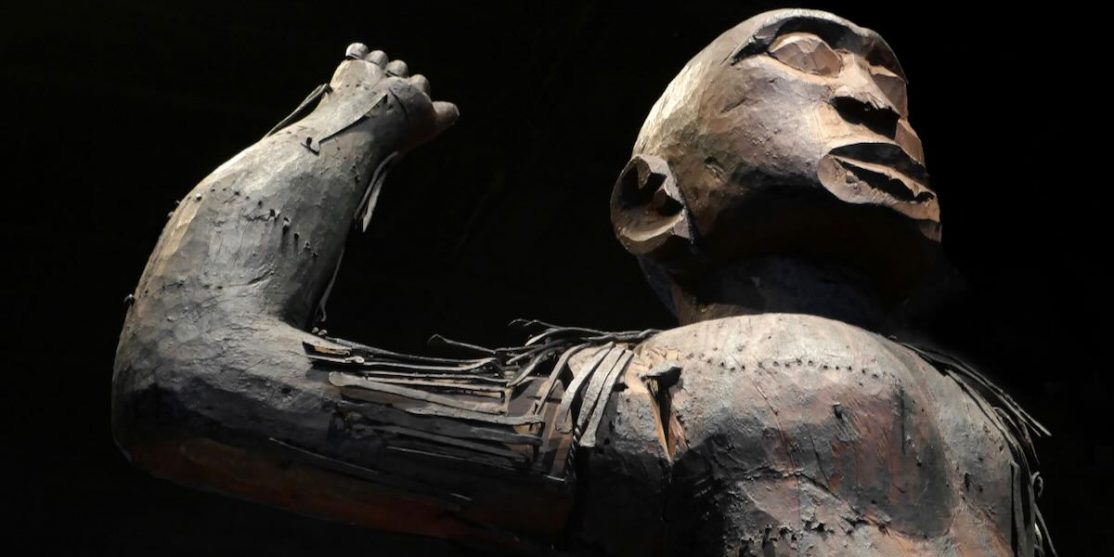MONDO
Reflections on the Upcoming Referendum in Turkey

On April 16, the electorate in Turkey will vote a proposal that foresees a major constitutional change. The draft was prepared by Erdogan’s Justice and Development Party (AKP). The proposed change is so fundamental that legal scholars suggest seeing it not as constitutional amendment but as regime change . This is because the proposal overrides fundamental constitutional principles. Professor of constitutional law, Murat Sevinç, dismissed from Ankara University by an executive decree, argues that evaluating formal aspects from a legal perspective is senseless. By backing the proposed draft, the AKP and the Nationalist Movement Party (MHP), the only other party whose president explicitly supports the change, posit themselves as the constitutive power that will institute a new political regime.
The alliance between the two parties represent a historical affinity between conservative and/or Islamist center-right parties with capitalist developmental paradigms and anti-communist and pious sectors of nationalists: defined in Turkish political history as the nationalist front. Today, the two sides are represented by the AKP and the MHP, the leaders of which are allied to vote YES, although parts of the MHP voters and cadres oppose the decision. This alliance has historically been strongest when cemented by a shared enmity toward the Kurdish left, social democrats, and socialist and/or communist movements. The past year has seen the Turkish political map once again bifurcate around similar lines. The NO camp is highly fragmented however, and hardly shares a program.
The debate, then, should be historical: the proposed change is envisioned by Erdoganists as the ultimate blow by the Turkish nation (millet) against the tutelage (vesayet) of a bureaucratic minority that has obstructed elected governments by posing as the guardians of the Kemalist regime. This guardianship is often attributed to the military but also, the judiciary. The nation, here, refers to a conservative-nationalist civilian majority, a multi-class alliance the backbone of which is a clientalist petty bourgeoisie. This now-constitutive power in the Erdoganist scenario has always opposed the Kemalist regime but was suppressed by the guardians despite decisively winning every election since the first multi-party elections in 1950 – partly but not wholly true. For Erdogan, rule by this electorally victorious majority is synonymous with democracy defined as the unhindered exercise of power by the %50 plus 1.
Tutelage refers to bureaucratic, juridical, or military authority exercised by non-elected institutions whose backbones have been public administration departments, law schools, and military academies respectively. Erdogan frames the referendum as the decisive battle against tutelage which has made Turkey a provincial polity in the European periphery and prevented the realization of the nation’s potential by means of majoritarian democracy, developmental dynamism, and independent foreign policy. The nation-tutelage binary is coupled with a culturalist ideology: the pious against the seculars, civilians against public servants, local Muslims against Europeanized ones, the authentic against the artificial. The content of the amendment is nothing but an improvisation tailored to realize this historic myth and to place the latter under the control of the former. Each former category above is another name for a nationwide civilian patronage network cemented by the cultural influence of the petty bourgeoisie, Sunni orders/foundations, cliental kinship reciprocities, and the organizational capability of right-populist parties. This network formed the social backbone for electoral victories especially when united under one party around a shared conservative nationalism. Nevertheless, at critical points of political history, the national front and the so-called organs of tutelage happily collaborated to isolate socialist or communist currents or left-wing labor unions from the social fabric by uniting their public and civilian means of coercion.
In the proposed system, a president elected by general vote will shape the cabinet and exercise unrestricted power to legislate and execute for a five year time span between two elections. Elections, here, are ‘winner takes all’ races after which the victor is unbothered by limits – popularity is the sole mechanism for keeping the government in check and the populace can voice its discontent only by voting. The opposition often uses football metaphors to argue that elections will produce unfair winners when referees (juridical and regulative bodies) are appointed by the reigning partisan president. In response, the propaganda video by the AKP depicts a young woman (the popular nation) showing a red card to a football referee (tutelage): the nation will rule against rules. For Erdogan, the nation only and truly speaks at the ballot box. He says, “we come by the ballot box and leave by the ballot box.” Erdogan deridingly tells the main opposition leader the same unrestricted power will be his, only if, his party ever wins the vote. The equation of democracy with the general vote justifies attacks on civil society and narrows the scope of political participation.
The ideological artifice that helps Erdogan most efficiently convince the petty bourgeoisie is equating coalition governments and ‘too much deliberation’ as the core cause of economic instability and crisis. This trick manipulates not only the concerns of the financially indebted petty bourgeoisie and wage earners but also the nationalist anxiety over the growing electoral success of the Peoples’ Democratic Party (HDP), the Kurdish and left alliance, whose %13 vote corresponded to 80 seats in the parliament in June 2015, more than MHP. This had forced the AKP to form a coalition government for the first time since 2002. AKP chose not to form a coalition, and instead led the country to a reelection five months later. In between, the war with the PKK reignited, economic favors were promised to upset clients among the petty bourgeoisie, and AKP managed to win back a single-party majority by reconsolidating the nationalist front. The proposed system aims to make sure a sequence such as this will not repeat.
That the economy is best managed single-handedly constitutes the core message and there is a strong economic motive behind the proposed architecture. Coalitions will not be possible, and an ideally deliberative parliament will not be the seat of decision making. Elections will be winner take all races, the trophy of which is the prerogative to execute ‘five-year development plans’. The president is envisioned as a super-executive in the model of a CEO who can appoint non-elected ministers to run the departments of a technocratic developmental apparatus. In between elections are five years of uninterrupted, fast, efficient, and non-deliberative execution. Hence, projects would be implemented with lower costs and the firms within the orbit of AKP-nepotism will accumulate faster domestically and seek shares in the global markets as the pioneers of this developmental state.
This uninterrupted developmental machine would narrow the venues of socioeconomic deliberation and contestation as well as inhibit competition between national firms by making them organs of a presidentially managed national economy – this latter aspect bothers the internationally connected sectors of the capitalist class. Oppositional litigation will be ineffective given partisan control over the judiciary. Readers will remember that the strongest challenge to the AKP was expressed via ecologic sensibilities. In the Gezi Park Rebellion, opposing the demolition of a public green space in central Istanbul to be replaced by a privately owned mall, became an occasion to express the growing anger at the non-stop appropriation of common spaces by construction projects. These projects not only demolish green spaces but also drastically contribute to the partisan accumulation of capital and solidify the nepotistic alliance between partisan capitalists and Erdogan’s party apparatus. The proposed system is designed to preemptively suffocate Gezi-type objections which are seen both by the AKP and its nepotistic capitalists as dangerous irritations. Besides the Gezi Rebellion, there has been many effective mobilizations in peripheral towns against gold mining, power plants, and other infrastructural projects which were led by small farmers already under economic pressure in a deregulated agricultural economy. In these mobilizations, environmental concerns, defense of farming autonomy, and a political refusal of unregulated and nepotistic accumulation of capital often merged.
Despite limited autonomy of the judiciary, regulative functions such as environmental impact evaluation did constitute venues for civil objections against capitalist accumulation projects. The new regime, however, envisions bureaucracy, law, and regulation exclusively as hindrances to faster development, as institutional irritations. In response to the global capitalist crisis, Erdoganism prescribes speeding up mega infrastructural investments such as a giant airport in Istanbul, digging a canal parallel to the Bosporus, expanding the autobahn network, and constructing hydro-electric, thermal, and nuclear power plants across the country. A recent development towards this aims is a new public fund designed to use all publicly owned enterprises – including the Turkish Airlines – as collateral for financing mega projects at a time of financial uncertainty. Speeding up means the total alignment of public institutions around the partisan developmental agenda of the AKP. No time for strikes, protests, or questions of ecology.
The proposed system gives the president the power to appoint and control almost all non-elected organs of the state. Among the most critical is the abolition of military autonomy, which is beyond this essay. One could briefly say that the failed coup attempt in July 2016 has not yet been truly investigated. Instead, the widespread disapproval of the failed coup was canalized toward the abovementioned myth – a grand opposition between the electoral nation and bureaucratic tutelage. The presidential system is marketed as the guarantor that interventions by non-elected institutions will not repeat and political and economic stability finally established once and for all. The myth erases the qualitative differences between different logics and functions of juridical, regulative, bureaucratic, or security organs of the state and vaguely defines their totality as restrictive tutelage over the political solidarity of the nationalist front and the will to develop. The envisioned system is a developmental party-state that restricts/bans contentious politics in and outside the parliament but which can, on paper, be governed by one party for five years and then another for the next.
The Police, under the Ministry of Interior, has long grown into AKP’s unofficial army, a capable but unregulated coercive force. It actively participates in the suppression of civilian opposition by using its coercive power, including against small initiatives distributing NO flyers across the country. On the southeastern front, the narrowing down of venues for civil contention, the jailing of hundreds of civilian politicians including the HDP Co-Chairs, and the indiscriminate counter-terrorist violence in Kurdish cities contribute to the remilitarization of the Kurdish issue. This atmosphere already casts doubt on the fairness of the upcoming vote. Both the public space and the mass media are almost entirely closed to oppositional publicity. Nevertheless, polls predict a close race.
What next?
Despite being the major pillars of the NO camp, the CHP and the HDP often diverge over their programs, priorities, and strategies. Moreover, the NO camp includes a sizeable part of the MHP; liberal spokespeople of the internationally connected capitalist class; the extra-HDP socialists and communists such as the June Movement and The People’s Turkish Communist Party as well as a critical minority from within the Islamist circles which advocates a rights-based reform agenda. This is a motley crowd that agrees on the dangers of the proposed architecture but disagrees on significant issues. Whether the outcome is a NO or a YES, the urgent task facing the opposition is to form a united front against the nationalist front by finding minimal points of convergence and coming up with a rival reform agenda given that a restitutive politics, often the position taken by the CHP, is meaningless. I am of the opinion that this is only possible if we can agree on a democratic socialist program that will 1) advocate a political economic program tailored to relate to everyday working class frustration over indebtedness, cost of living, unemployment, and job insecurity; 2) a civil rights program that would prioritize gender inequality and violence against women; and 3) invent a decentralized administrative model, agreeable to a wider majority than the left but tailored to facilitate peace negotiations in the Kurdish front and guarantee a pluralist social contract.




